Related Research Articles

The Battle of Kleidion took place on July 29, 1014, between the Byzantine Empire and the Bulgarian Empire. It was the culmination of the nearly half-century struggle between the Byzantine Emperor Basil II and the Bulgarian Emperor Samuel in the late 10th and early 11th centuries. The result was a decisive Byzantine victory.

Asparuh was а ruler of Bulgars in the second half of the 7th century and is credited with the establishment of the First Bulgarian Empire in 681.

Tsar SimeonI the Great ruled over Bulgaria from 893 to 927, during the First Bulgarian Empire. Simeon's successful campaigns against the Byzantines, Magyars and Serbs led Bulgaria to its greatest territorial expansion ever, making it the most powerful state in contemporary Eastern and Southeast Europe. His reign was also a period of unmatched cultural prosperity and enlightenment later deemed the Golden Age of Bulgarian culture.
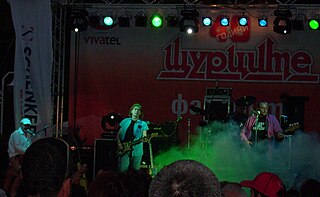
Shturcite, sometimes romanized as Shturtsite, was a Bulgarian rock group. They were one of the most successful bands in Bulgaria during the 1970s and 1980s and still have many fans. The band broke up once in 1990, reformed in 1997, and disbanded again in 2013. The group has been characterized as "Bulgaria's answer to The Beatles".

Ivan Alexander, also sometimes Anglicized as John Alexander, ruled as Emperor (Tsar) of Bulgaria from 1331 to 1371, during the Second Bulgarian Empire. The date of his birth is unknown. He died on 17 February 1371. The long reign of Ivan Alexander is considered a transitional period in Bulgarian medieval history. Ivan Alexander began his rule by dealing with internal problems and external threats from Bulgaria's neighbours, the Byzantine Empire and Serbia, as well as leading his empire into a period of economic recovery and cultural and religious renaissance.

Samokov is a town in Sofia Province in the southwest of Bulgaria. It is situated in a basin between the mountains Rila and Vitosha, 55 kilometres from the capital Sofia. Due to the suitable winter sports conditions, Samokov, together with the nearby resort Borovets, is a major tourist centre.
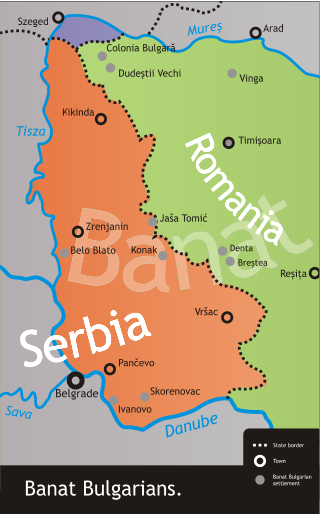
The Banat Bulgarians, also known as Bulgarian Roman Catholics and Bulgarians Paulicians or simply as Paulicians, are a distinct Bulgarian minority group which since the Chiprovtsi Uprising in the late 17th century began to settle in the region of the Banat, which was then ruled by the Habsburgs and after World War I was divided between Romania, Serbia, and Hungary. Unlike most other Bulgarians, they are Roman Catholic by confession and stem from groups of Paulicians and Roman Catholics from modern northern and northwestern Bulgaria.

Ivanovo is a village located in the Pančevo municipality, in the South Banat District of Vojvodina, Serbia. It has a population of 974 inhabitants.

The Battle of the Gates of Trajan was a battle between Byzantine and Bulgarian forces in the year 986.
The Battle of Kreta occurred in 1009 near the village of Kreta to the east of Thessaloníki. Since the fall of the Bulgarian capital Preslav to the Byzantines in 971, there was a constant state of war between the two Empires. From 976, the Bulgarian noble and later Emperor Samuel successfully fought against the Byzantines but, from the beginning of the 11th century, fortune favoured Byzantium, which recovered from previous severe losses. From 1002 Basil II launched annual campaigns against Bulgaria and seized many towns. In 1009 the Byzantines engaged the Bulgarian army to the east of Thessaloníki. Little is known for the battle itself but the result was a Byzantine victory. Five years later, the Byzantines decisively defeated the Bulgarian army at Kleidion and by 1018 the country was thoroughly conquered by Basil II.
Nestoritsa was a Bulgarian noble and general during the reign of Emperors Samuil (997-1014); Gavril Radomir (1014–1015) and Ivan Vladislav (1015–1018). He was one of Bulgaria's most skillful military commanders.
Tonika was a Bulgarian pop music group similar in style to the Italian group Ricchi e Poveri.
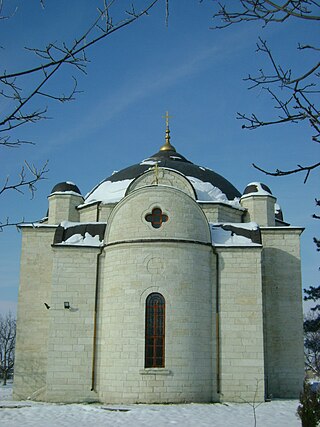
Uzundzhovo is a village in southeastern Bulgaria, part of Haskovo municipality, Haskovo Province. As of 2008, it has a population of 1,727 and the mayor is Vancho Vanchev. The village lies in the agricultural Upper Thracian Plain, east of Haskovo, south of Dimitrovgrad and west of Simeonovgrad and Harmanli. During Ottoman rule, the village was known as Uzunca ova, a direct translation of the area's former Byzantine Greek appellation, Makri livada. The village's current name is derived from the Ottoman Turkish name and modified with the Slavic placename suffix -ovo. An architectural reminder of the village's Ottoman history can also be seen, as the local Church of the Assumption was built originally as a mosque. Uzundzhovo hosts the Bulgarian Air Force's 21st Fighter and Bomber Airbase, shut down in 1998.

The Golden Orpheus was an international song contest, held annually from 1965 to 1999 in Sunny Beach, Bulgaria. Alongside its Bulgarian pop song competition, the festival’s rules and regulations included an international singing contest. The event quickly grew to be one of the most prestigious Eastern European festivals during socialism. The event has been broadcast on the International Radio and Television Organisation - Intervision network since 1967 with a viewership of nearly 200 million viewers.
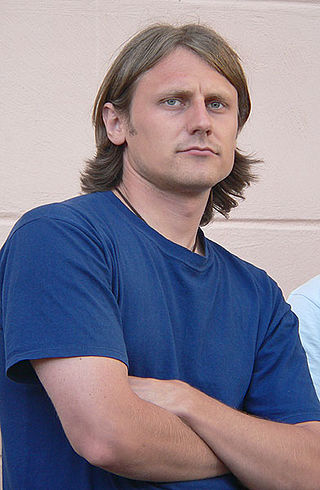
Ivan Hristov or Ivan Christoff is a Bulgarian poet, and critic.
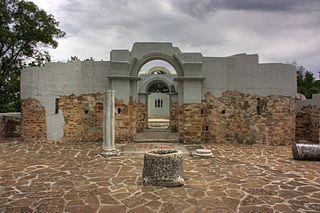
The Round Church, also known as the Golden Church or the Church of St John, is a large partially preserved early medieval Eastern Orthodox church. It lies in Preslav, the former capital of the First Bulgarian Empire, today a town in northeastern Bulgaria. The church dates to the early 10th century, the time of Tsar Simeon I's rule, and was unearthed and first archaeologically examined in 1927–1928.
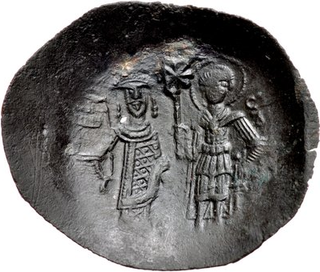
Ivan Asen II, also known as John Asen II, was Emperor (Tsar) of Bulgaria from 1218 to 1241. He was still a child when his father Ivan Asen I – one of the founders of the Second Bulgarian Empire – was killed in 1196. His supporters tried to secure the throne for him after his uncle, Kaloyan, was murdered in 1207, but Kaloyan's other nephew, Boril, overcame them. Ivan Asen fled from Bulgaria and settled in the Rus' principalities.
Vek was a Russian weekly magazine which was published in Saint Petersburg from January 1861 until May 1862.

Sratsimir was a Bulgarian magnate with the title of Despot, holding the territory of Kran. It is unclear when he received the governorship of Kran; he held it before and during the reign of his son, Ivan Alexander. He married Keratsa Petritsa, a member of the Shishman dynasty, with whom he had five children. He was the eponymous founder of the Sratsimir dynasty.
Luben Mortchev is a Bulgarian theatre, film and TV director, playwright, and professor at the National Academy for Theatre and Film Arts “Krastyo Sarafov” (NATFA).